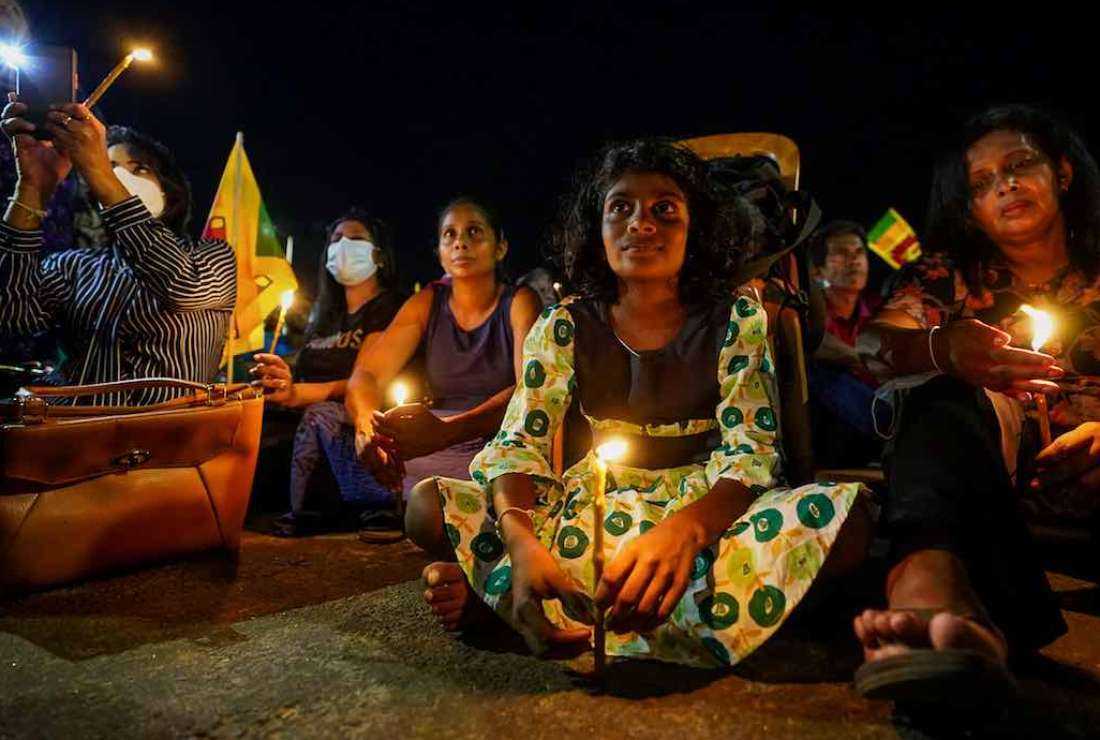
Demonstrators light candles during a silent protest to pay respect to the victims of the 2019 Easter Sunday suicide bombings at three churches and three deluxe hotels that killed almost three hundred people, on the day to mark the third anniversary of the attacks near the president's office in Colombo on April 21, 2022. (Photo by AFP)
A new documentary by a United Kingdom-based broadcaster has supported a claim by Sri Lankan Church officials that senior government officials played a crucial role in engineering the deadly terrorist attacks on 2019 Easter Sunday, which took the lives of 272 churchgoers and maimed hundreds.
The documentary telecast by Channel 4 on Sept. 6 centered around the revelations of a whistleblower named Hanzeer Azad Maulana, who was attached to a Sri Lankan paramilitary group.
He alleged senior officials close to the politically powerful Rajapaksa family facilitated the simultaneous bombings to create a sense of insecurity in the country and come to power on the plank of national security.
Catholic Church officials in this island nation, led by its only Cardinal Malcolm Ranjith, have been challenging the account that the bombings were a terrorist act, airing strong allegations that the bombings were for political power, executed using Islamic terrorists.
Cardinal Ranjith repeated the allegation in the documentary: “You have many such involvement of top leadership in Sri Lanka, who were in a grand plot in order to take power,”
The whistleblower claimed that in 2018 he arranged a secret meeting with then-senior Military Intelligence official Major General Suresh Salley and a group of highly radicalized Muslim youths, who turned out to be suicide bombers.
“The meeting finished, Suresh Salley came to me and told me the Rajapaksas need an unsafe situation in Sri Lanka, that’s the only way for Gotabaya Rajapaksa to become president," he alleged.
“The attack was not a plan made in just one or two days, the plan was two, three years in the making,” Maulana claimed in the documentary, which also featured another anonymous government official corroborating the claims made by the whistleblower.
Former President Gotabaya Rajapaksa announced his presidential candidacy days after the attack on the plank of national security. He promoted Sallay as Chief of State Intelligence Service soon after he took office.
It was the first time a military officer was appointed to the top spy post, which is often held by senior civilian officials from the police.
Salley denied any connections to the attacks and told the broadcaster that at the time of his alleged meeting with terrorists, he was in Malaysia. When the bombs went off he was in India, he claimed according to the documentary.
Hours before the documentary was aired, the issue of the country’s senior security officials being implicated was discussed in the cabinet meeting led by President Ranil Wickremesinghe, who was prime minister at the time of the attacks.
The parliament announced on Sept. 5 the decision to appoint a committee to study fresh allegations made by the broadcaster. But it expressed skepticism on the timing of the broadcast when Sri Lanka’s record on human rights and wartime accountability came under scrutiny at United Nations Human Rights Council (UNHRC) sessions in Geneva.
In 2011, the broadcaster aired another hitting documentary titled “Sri Lanka’s Killing Fields,” documenting evidence of human rights violations alleged to have been committed by the government forces to crush in 2009 the ethnic Tamil’s armed struggle for a homeland. The United Nations (UN) Committee considered those excesses to amount to war crimes.
Opposition leader Sajith Premadasa called for an international investigation into the disclosures by the UK broadcaster. He said local mechanisms failed to bring justice to the victims.
Meanwhile, Colombo High Court on Sept. 4 took up a defamation case filed by Salley against a Catholic priest, Gamini Fernando. The priest allegedly said Sally was party to the attack.
Salley had demanded 50 million Sri Lankan rupees as compensation for the damages caused to his prestige because of the statement the priest made in a virtual seminar held on October 23, 2021.
The case is postponed till February next year.


